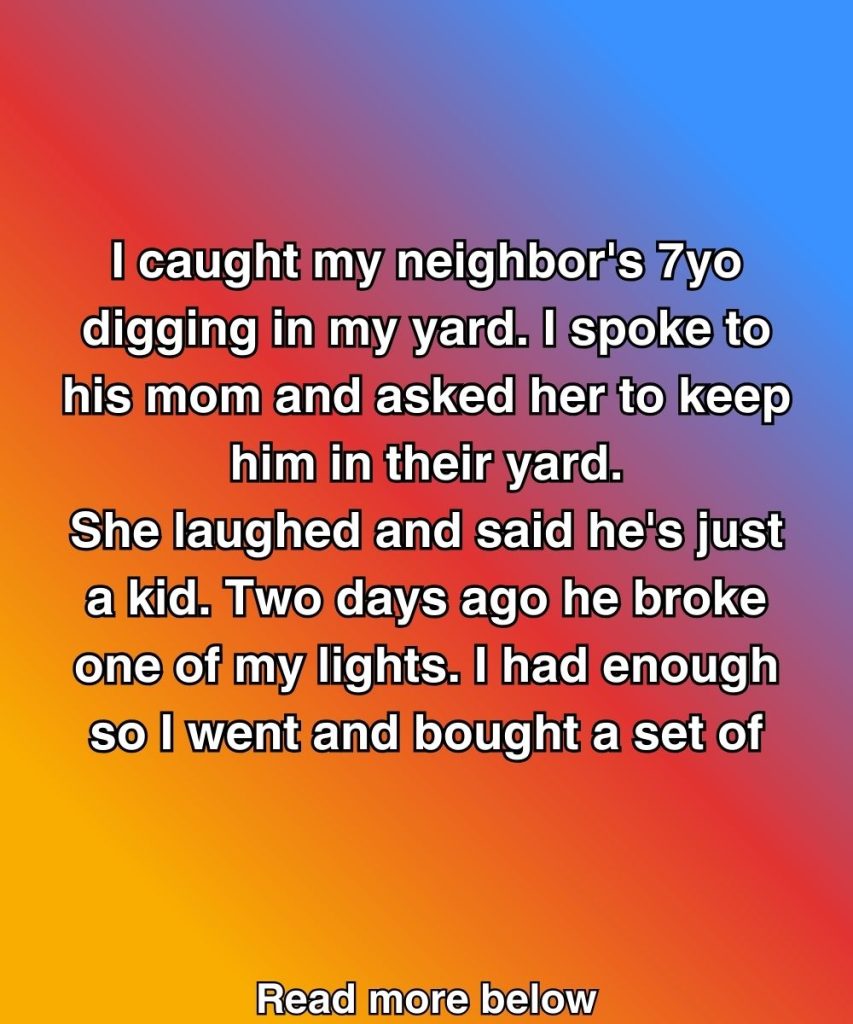I didn’t set out to be “that neighbor.” I just wanted my yard to survive the summer. After weeks of kneaded flower beds, torn mulch, and even a crumpled juice box stuffed in my mailbox, I finally walked next door and asked Tayo’s mom, Kendra, to please keep her seven-year-old on their side of the fence. She laughed. “He’s just a kid,” she said, like that made the tulip bulbs reappear.
Two days later, one of my path lights was in pieces.
I didn’t yell. I bought solar spotlights with motion sensors and tucked them along the garden border—bright enough to stop a raccoon, subtle enough not to start a war. The first night they triggered at 8:30. I peeked through the blinds and caught Tayo sprinting across my grass, giggling, his mother’s voice drifting behind him: “Tayo! Come back here!”
By morning, a light hung by its cord, cracked.
I started documenting. Photos. Receipts. Timestamps. No door-pounding, no confrontations—just a quiet log of trampled begonias and the chalk mural that crept across my front steps. Then a note appeared on my windshield, thick marker on lined paper: “STOP WATCHING MY SON OR ELSE.”
I brought it to the police. Without a pattern, there wasn’t much they could do, but they photographed the note and told me to keep a nuisance log. So I did.
One afternoon, Mr. Olufemi from two doors down paused by my hedge. “You’re not crazy,” he said. “Same thing with my roses last summer. My grandson saw the boy with scissors.” He shook his head. “They think everyone should tolerate it because he’s a child. He’s learning rules don’t matter.”
It escalated anyway. I came home to a plastic lawn flamingo rammed through my mailbox, skewering a stack of letters, including a utility bill. I installed a doorbell camera. The footage the next evening showed Tayo tossing small rocks at my porch light while Kendra chatted on her phone a few feet away.
I sent everything to the HOA and filed a formal complaint. They’d had “concerns” before, but never evidence. The warning letter went out.
Kendra arrived at my door with her phone recording. “Oh, you think you’re slick? Recording my kid like he’s a criminal? You’re sick!” I kept my voice even. “He’s damaged property. I’m documenting it.”
Two weeks later, I was served. Small claims court: “emotional distress” and “unauthorized filming of a minor.”
I sat at my dining table, hands shaking, and decided I was done playing defense. I printed the photos, compiled timestamps, clipped statements from neighbors willing to speak—one signed, two anonymous—and burned the footage to a drive.
In court, the judge was all business. Kendra spoke first: a single mom doing her best, a neighbor “spying on her child,” feeling “harassed” in her own community. When it was my turn, I handed over the file. The judge watched the clip of rocks pinging off my porch light while Kendra stood nearby. “Can you explain this?” he asked.
Her face faltered. “Kids make mistakes. You don’t ruin families over a few rocks.”
“You pursued legal action,” the judge said evenly. “You escalated this.” He dismissed her claim and issued a property-harassment protective order—nothing criminal, just teeth for the boundaries.
She left without a word, dragging Tayo by the hand.
Two weeks later, a knock. A woman I’d never met stood on my porch. “I’m Dola,” she said. “Kendra’s mother. I’m sorry for everything.”
We sat on the steps. She told me Kendra’s husband had left last year. That Kendra doesn’t know how to ask for help. That Tayo is acting out and needs structure. “She embarrassed herself,” Dola said quietly. “She’s staying with me for a while. I’ll watch Tayo after school. If you’re willing… maybe we can start fresh?”
We tried. Dola walked Tayo home every afternoon and kept him inside when I was gardening. She showed up once with banana bread and an apology folded into the foil. Slowly, the air changed.
One evening, Tayo hovered at the edge of my lawn. He waved. I waved back. The next week, he arrived with Dola and handed me a drawing—two houses, two gardens, a big purple “SORRY” at the top. He told me he wanted to plant a tree someday. I said if he could follow directions, maybe we could plant one together.
In the fall, we planted a cherry blossom near the boundary line. I showed him how to dig without tearing the roots, how to pack the soil gently. He was careful. Focused. His mom watched from the window.
I haven’t forgotten. The camera’s still up. I still keep receipts. But I started seeing them not as adversaries, but as a family that spun out and needed rails to hold onto. Boundaries mattered. So did accountability. Sometimes people lash out because they don’t know what else to do.
We never became best friends. Things just got… quiet. Better.
Last spring, the cherry blossom bloomed. I stood on the porch and looked at pale petals drifting across both yards and thought: maybe the point of a boundary isn’t to push people away. Maybe it’s to give them a line to respect so they can come back better.
If you’ve ever been the neighbor who needed to hold the line—don’t give up. Protect your peace. Leave room for growth. You never know where a second chance might take root.


